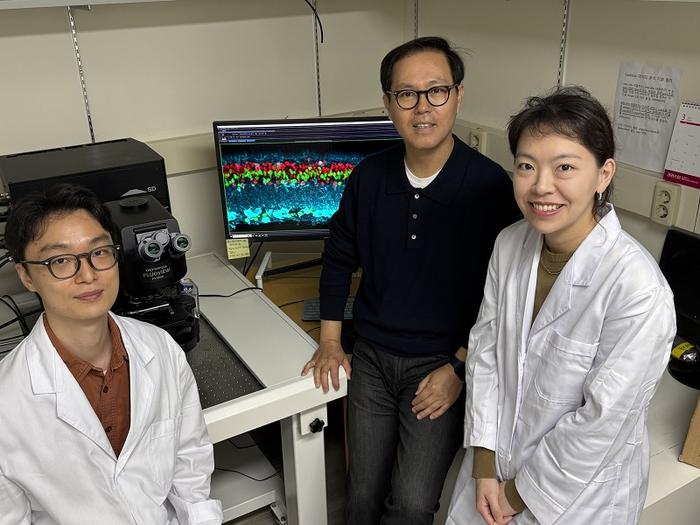In a groundbreaking advancement that could redefine treatment options for millions afflicted by vision loss, researchers at the Korea Advanced Institute of Science and Technology (KAIST) have unveiled a revolutionary drug designed to restore vision through innovative retinal nerve regeneration. This pivotal discovery comes in response to the stark reality that over 300 million individuals globally are imperiled by various retinal diseases, many of which lead to irreversible blindness.
The establishment of a viable treatment protocol capable of reversing vision loss has long eluded scientists and medical professionals alike. Existing therapies have predominantly centered around slowing the progression of retinal diseases, but the restoration of previously lost sight remained a distant hope—until now. With the announcement made on March 30 by KAIST President Kwang Hyung Lee, the research led by Professor Jin Woo Kim from the Department of Biological Sciences showcases significant advancements in the realm of retinal regeneration.
At the core of this project appears a strategic interference with the PROX1 protein, known for its role as a suppressor of retinal regeneration. Through the administration of a unique compound that inhibits this specific protein, the research team succeeded in inducing retinal regeneration and achieving substantial vision recovery in disease-model mice. This remarkable outcome persisted over a notably extended period, exceeding six months. The ability to induce long-term neural regeneration in mammalian retinas for the first time offers a beacon of hope to patients currently without effective treatment options.
As the aging population grows, the incidence of retinal diseases continues to rise, amplifying the urgency for effective therapeutic strategies. Despite extensive research, no current methods have succeeded in reinstating vision or repairing damaged retinas, primarily due to the inherent limitations in the regenerative capabilities of mammalian retinas. Distinct from cold-blooded species such as fish, which showcase remarkable retinal healing properties, mammals experience debilitating limitations when it comes to retinal damage repair.
The research team’s insights drew inspiration from studies conducted on aquatic wildlife, where retinal injuries trigger Müller glia cells’ transformation into retinal progenitor cells, subsequently leading to new neuron formation. Unfortunately, this regenerative process fails in mammals, resulting in sustained and permanent retinal impairment. By identifying the molecular underpinnings responsible for this disparity, particularly the role of PROX1, the KAIST researchers have opened a new chapter in retinal research.
In a schematic representation of the proposed regeneration mechanism, it was revealed that the PROX1 protein, secreted by damaged retinal neurons, inhibits the necessary dedifferentiation of Müller glia into progenitor cells. The administration of an antibody that captures PROX1 outside the cells effectively disrupts this inhibitory transfer process, thereby stimulating the migration and multiplication of Müller glia and facilitating the restoration of visual function.
Further investigation led to the identification of PROX1 as a critical obstacle in fostering Müller glial dedifferentiation. Proteins residing in neuronal tissues, including the retina and its associated structures like the spinal cord and hippocampus, were found to suppress the proliferation of neural stem cells while promoting their differentiation into neurons. In their study, the researchers uncovered that the PROX1 protein accumulates in Müller glia in damaged mouse retinas, while similar cells in fish exhibit no such accumulation, thus enabling their regenerative capacity.
Building upon these findings, the team devised a method targeted at restoring Müller glia’s regenerative capacity through the removal of extracellular PROX1 prior to its interaction with these glial cells. The strategy involves administering an antibody that specifically binds to PROX1, developed through collaborations with Celliaz Inc., a biotech startup established by Professor Jin Woo Kim. Upon testing this antibody in disease-model mice, a marked enhancement in neural regeneration was observed, ultimately resulting in vision restoration that persisted over six months.
The applicability of this retinal regeneration-inducing therapy is promising, as Celliaz Inc. is currently working towards adapting this method for various degenerative retinal diseases that presently lack effective treatment options. The goal is to initiate clinical trials by the year 2028, translating these laboratory successes into real-world applications that could dramatically alter the treatment landscape for retinal diseases.
This venerable work is bolstered by a comprehensive study co-authored by Dr. Eun Jung Lee, also affiliated with Celliaz Inc., alongside Museong Kim, a doctoral candidate at KAIST. Their collaborative research effort reflects the collective pursuit of a shared goal: to provide effective solutions for individuals facing the specter of blindness, particularly those who currently find themselves without viable treatment paths. The groundbreaking findings were published on March 26 in the reputable journal Nature Communications, and they highlight a trajectory of hope for many individuals affected by degenerative retinal disorders.
Dr. Lee underscored the urgency of efforts surrounding the optimization of the PROX1-neutralizing antibody, known as CLZ001, with a focus on progressing into preclinical studies. The overarching ambition is clear: to offer a viable treatment avenue that alleviates suffering and restores sight to millions at risk of blindness. This commitment to advancing science and healing underscores the intrinsically collaborative nature of modern medical research, where academic rigor meets innovative entrepreneurial efforts.
In conclusion, the advances made by the KAIST researchers represent more than just a scientific achievement; they reflect a profound commitment to addressing one of humanity’s most formidable health challenges. As the implications of this research unfold, the hope for restored vision becomes increasingly tangible, promising a brighter future for countless individuals navigating the challenges of retinal disease.
Subject of Research: Retinal nerve regeneration and vision restoration
Article Title: Restoration of retinal regenerative potential of Müller glia by disrupting intercellular Prox1 transfer
News Publication Date: March 30, 2025
Web References: Nature Communications
References: N/A
Image Credits: KAIST Laboratory of Neural Development and Regeneration
Keywords: retinal regeneration, vision restoration, PROX1 protein, Müller glia, ocular diseases, KAIST research, therapeutic innovation, neural recovery.




